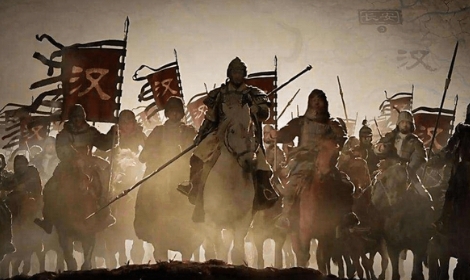QA问答:历史上有哪些不可避免的重复模式——大国的兴衰
正文翻译
What are some inevitable recurring patterns throughout history?
历史上有哪些不可避免的重复模式?
历史上有哪些不可避免的重复模式?
评论翻译
Ahmad Abubakr (احمد ابوبکر)
Rise and fall of Great Powers
What many people do not seem to notice is that no power can remain at the top of the world forever. Time will decay everything. It is inevitable. The second a country or empire becomes a great power, the never-ending fight against decay begins. The result has been and always will be the same. Some hold onto that power for a year, others for a decade, a few for centuries but eventually all empires face that inevitable fall.
大国的兴衰。
许多人似乎没有注意到的是,没有任何力量能够永远保持在世界之巅。
时间会腐蚀一切。这是不可避免的。
一个国家或帝国一旦成为大国,就开始了与腐朽的无休止的斗争。结果一直都是,而且永远都是一样的。
一些国家能保持这种权力一年,另一些国家能保持十年,几个世纪,但最终所有帝国都面临着不可避免的衰落。
The interesting thing to note is that the people of these powers are usually blind to the decay and collapse until it actually sets in. Each at their prime belief themselves to be the greatest and themselves to be exceptional. This is visible even now. At the moment there is only a single superpower, United States of America. Many times you will see US citizens call it the greatest country in human history and the pinnacle of human civilization. Are they wrong? Probably not. However, that does not truly make the US exceptional. It is simply the latest fad and like all the ones before, it will be replaced by another. The same way the US replaced Great Britain. The new power will then become the pinnacle of human civilization, only to be eventually replaced by another. No empire or country is truly exceptional.
值得注意的是,拥有这些权力的人通常对衰退和崩溃视而不见,直到衰退开始蔓延。
每个国家在他们的全盛时期,都相信自己是最伟大的,自己是非凡的。
就算到了现在,这种情况也是如此显而易见。
目前只有一个超级大国,美利坚合众国。很多时候,你会看到美国公民把美国称为:人类历史上最伟大的国家和人类文明的顶峰。
他们错了吗?可能没错。
然而,这并不能真正使美国与众不同。这只是最新的时尚,就像以前的所有时尚一样,它将被另一种时尚所取代。就像美国取代英国一样。
新的力量将成为人类文明的新顶峰,但最终会被另一种力量所取代。没有哪个帝国或国家会是真正的例外。
Let us focus on some empires of the past so that the pattern becomes apparent. Starting with a recent great power, the British Empire.
This is the British empire at it’s greatest extent. The richest and most powerful Empire in the entire world. A navy that would bring all to their knees. The citizens of this country could never see how such a great empire could possibly decline and fall. They considered it the greatest empire in human history as well. Who can forget the phrase, “the sun will never set on the British Empire”. But time decayed the empire and eventually, the sun did very well set on the British Empire.
Prior to the British Empire, that phrase was actually coined for the Spanish Empire in the 16th and 17th centuries.
让我们把注意力集中在过去的一些帝国上,这样这种模式就会变得更显而易见。
从最近的一个大国——大英帝国开始。
下图是大英帝国的最大规模(图略)。全世界最富有、最强大的帝国。拥有一支能让所有人屈服的海军。
这个国家的公民,永远看不到这样一个伟大的帝国会如何衰落。他们也认为它是人类历史上最伟大的帝国。
谁能忘记“在大英帝国,太阳永远不会落下”这句话呢?
但时间让帝国腐朽了,最终,太阳在大英帝国落下了。
在大英帝国之前,这个短语实际上是在16世纪和17世纪为西班牙帝国创造的。
This empire was everything that the British would eventually become. the greatest of the colonizers and empire builders. None could stand against the Spanish Armada. Like all other before and after it, the Empire decayed and fell.
One thing becomes apparent. The citizens of each great power have great pride in their country and its power. They are sure of it. Its decay and fall cannot be seen until it is too late. Each views itself as exceptional and different than the ones that preceded it.
这个帝国就是英国人最终成为的一切。最伟大的殖民者和帝国缔造者。没有人能与西班牙无敌舰队对抗。就像它之前和之后的所有其他东西一样,帝国最终腐朽堕落。
有一件事变得显而易见。每一个大国的公民都为自己的国家及其权力感到骄傲。他们对此非常确信。直到为时已晚,才能看到它的腐烂和坠落。每个国家都认为自己与众不同,与之前的国家不同。
What better way to describe this than by showing the Ak-Saray Palace (White Palace) of Tamerlane. Tamerlane carved out the Timurid Empire from the surrounding territories. Each rival fell against this great new empire. The Persians, the Ottomans, the Delhi Sultanate and the Golden Horde. None could match the power of the Timurids. In the city of his birth, Tamerlane had a grand palace built so that all that would come would see the power of his great empire. The greatest and the most beautiful of all palaces in the world. Gates that stood 70 meters tall, making all who would enter feel small and insignificant. On top of the palace was written in large letters, “If you challenge our power— look at our buildings.” Which man could set their eyes upon this palace and ever imagine the fall of the Timurid Empire? 600 years later, this is what remains of this once great palace.
还有什么比展示帖木儿的阿克萨莱宫(白色宫殿),能更好的描述这一点呢。
帖木儿从周围的领土上建立了帖木儿帝国。每一个对手都能与这个伟大的新帝国分庭抗礼。波斯人、奥斯曼人、德里苏丹国和金帐汗国。但没有人能比得上帖木儿王朝的力量。
在他出生的城市,帖木儿建造了一座宏伟的宫殿,这样所有的人都能看到他伟大帝国的力量。世界上最伟大、最美丽的宫殿。
70米高的大门,让所有进入的人,都感觉到自己的渺小和无足轻重。
宫殿顶部用大写字母写着:“如果你想挑战我们的力量,就看看我们的建筑。”
看到这座宫殿的哪个人,会想到帖木儿帝国的衰落呢?
600年后,下图就是这座曾经伟大的宫殿的遗迹:

How will the great cities of today stand the test of time? What will New York and Los Angeles look like in half a millennium? Will they really be any different than all of the cities that have preceded them?
In the end, we are all just insignificant beings desperately trying to withstand the sands of time. Not even realizing just how small we are in the grand scheme of things.
今天的大城市,要如何才能经受住时间的考验?半个千年后,纽约和洛杉矶会是什么样子?他们真的会和之前的所有城市有什么不同吗?
最终,我们都只是微不足道的生命,拼命地试图抵御时间的沙子。甚至没有意识到我们在全局中是多么渺小。
Luke Hatherton
Tamerlane’s story is indeed the ur-example of the impermanence of power. He built a mighty empire over the course of 35 years of endless campaigning and wanton destruction. He was bloodthirsty and sadistic, inflicting appalling suffering and death even by the standards of his day. He buried people alive, threw them down wells, cemented them into walls, and built pyramids of skulls - the first conqueror to achieve notoriety for that. (Contrary to popular belief, the Mongols, as bad as they were, did not do this.) His conquests caused the deaths of up to 17 million people, or 5% of the world’s population at the time.
帖木儿的故事,确实是权力无常的一个例子。
经过35年无休止的运动和肆意的破坏,他建立了一个强大的帝国。
他嗜血成性,虐待成狂,甚至以当时的标准来看,也造成了骇人听闻的痛苦和死亡。
他活埋别人,把他们扔到井里,用水泥把他们粘在墙上,并建造了头骨金字塔——这是第一个因此而臭名昭著的征服者。
与人们普遍认为的相反,尽管蒙古人很糟糕,但他们并没有这样做。
帖木儿的征服,导致多达1700万人死亡,占当时世界人口的5%。
Tamerlane’s last major rival was Ming China. He therefore wanted to destroy it to become the most powerful ruler on earth. This was an impossible dream - the Ming was at its height and too powerful even for him. For instance, Tamerlane had 200,000 troops at his disposal. The Yongle Emperor had *one million* in his standing army, expertly trained and skilled at fighting nomads.
帖木儿的最后一个主要对手,是中国的明朝。他想摧毁它,成为世界上最强大的统治者。
这是一个不可能实现的梦想,当时的明朝正处于鼎盛时期,甚至对帖木儿来说,也是太强大了。
例如,帖木儿有20万军队可供他使用。永乐皇帝的常备军有一百万,训练有素,善于与游牧民族作战。
Nevertheless, Tamerlane was so desperate to challenge the Ming, his last great enemy, before he died that in December 1404, at about the age of 70 and in failing health, he embarked on an insane winter march across Central Asia through blizzards and deep snow, while being carried in a litter, wrapped in furs. His soldiers had to dig through four feet of snow and ice to reach water, and many people and animals froze to death.
Tamerlane caught a fatal cold and died in a palace at Otrar, in modern-day Kazakhstan, on February 17, 1405, having toiled only 300 miles and still 1,500 miles from the Chinese border. Shortly before his death, he asked his attendants to pray to God to have mercy on him.
尽管如此,帖木儿在去世前,仍然不顾一切地挑战他的最后一个劲敌明朝。
以至于在1404年12月,大约70岁的健康状况不佳的帖木儿,在暴风和大雪中,被裹在皮草里,被人用担架抬着,开始了一场疯狂的冬季行军,穿越中亚。他的士兵们不得不在四英尺厚的冰雪中挖掘,才能接触到水,许多人和动物被冻死。
帖木儿患了致命的感冒,死在讹答剌的一座宫殿里。讹答剌位于现代的哈萨克斯坦。1405年2月17日,帖木儿只艰难跋涉了300英里,距离中国边境仍有1500英里。在他去世前不久,他让他的侍从向神灵祈祷,希望神灵怜悯他。
Tamerlane’s body was taken back to Samarkand for burial. His huge empire fragmented immediately after his death, and the last remnants vanished almost exactly a century later, in 1507. It might as well have never been.
Tamerlane wanted to be remembered forever. Today, he is almost completely forgotten outside of Western, Central and South Asia, where his memory survives in all but his native Uzbekistan only as that of a murderous warlord. He left no lasting political or cultural legacy. The vast killings, the bloodbaths, the ruin and devastation - all for nothing. Fittingly, only his tomb, the Gur-e-Amir in Samarkand, remains.
帖木儿的遗体被运回撒马尔罕安葬。他的庞大帝国在他死后立即分裂,最后的残余在几乎整整一个世纪后的1507年消失了。就好像从来没有存在过一样。
帖木儿希望人们永远记住他。如今,在西亚、中亚和南亚以外的地方,他几乎被完全遗忘了。除了他的祖国乌兹别克斯坦,人们对他的记忆只是一个凶残的军阀。他没有留下任何持久的政治或文化遗产。大规模的杀戮、血雨腥风、毁灭和破坏——一切都是徒劳的。
恰当的是,现在只剩下他的陵墓,撒马尔罕的 Gur-e-Amir。
Ahmad Abubakr (احمد ابوبکر)
He never actually fought against the Ming dynasty. He was already too old and became desperate. He invaded China in the winter, something he always avoided in all of his other conquests. His desperation for the conquest of China led to his death.
他从未真正与明朝作过战。他已经太老了,绝望了。他选择在冬天入侵中国,这是他在其他所有征服中一直避免的。他对征服中国的绝望导致了他的死亡。
He may have been able to defeat the Chinese as well had he been younger. The Chinese were powerful no doubt but so were all of the others. The Ottomans too were powerful enough to strike fear into the hearts of their neighbors. The Golden horde had been restored by Tokhtamysh and had retaken their old lands after defeating the Russians and Grand Dutchy. The Delhi Sultanate was the same powerhouse of India that had once before easily repelled the Mongols. Each was considered unbeatable and yet Tamerlane dispatched off them with relative ease.
如果他年轻的话,他可能也能打败中国人。
毫无疑问,中国人很强大,但其他所有人也是如此。
奥斯曼人的力量,也足以让他们的邻居感到恐惧。
金帐汗国已经被札兰丁·汗恢复,并击败了俄罗斯人和 Grand Dutchy ,夺回了他们的旧土地。
德里苏丹国是印度曾经轻易击退蒙古人的强大力量。
每个国家都被认为是不可战胜的,但帖木儿却相对轻松地击败了他们。
The man may have been a bloodthirsty psychopath and someone who could make Hitler look like Jesus, but there is no doubting his competence and genius as a conqueror.
这个人可能是一个嗜血的精神病患者,可以让希特勒看起来像耶稣,但毫无疑问,他作为征服者,是有能力和天赋的。
Luke Hatherton
I agree with you about Tamerlane’s phenomenal ability to defeat or destroy very strong opponents. Tamerlane knew the Ming would be his most formidable foe, which is why he paid obeisance to the Ming until he had destroyed or neutralized every other enemy he faced and felt strong enough to go to war with them.
我同意你的话:帖木儿能力非凡,可以击败或摧毁非常强大的对手。
帖木儿知道明朝将是他最可怕的敌人,这就是为什么他向明朝表示顺从,直到他摧毁或消灭了他所面对的所有其他敌人,并感到自己足够强大的时候,才向他们开战。
But Ming China was on another level compared to all of Tamerlane’s previous opponents. In this case, I believe Tamerlane had finally succumbed to hubris. Tamerlane attacked the Ming in 1405, when it was at the peak of its strength. Unlike Tamerlane’s other enemies, he may have finally met his match in the Yongle Emperor. Yongle was one seriously tough hombre. He was much younger than Tamerlane and rode on fierce and brilliant campaigns with his armies. Tamerlane’s army was 200,000 strong - but Yongle’s was *one million* strong. If Tamerlane’s empire was huge, Yongle’s was gigantic.
但与帖木儿之前的所有对手相比,中国的明朝处于另一个水平。
在这种情况下,我相信帖木儿最终只是屈服于自己的傲慢。
帖木儿于1405年进攻明朝,当时他正值其实力的巅峰。与帖木儿的其他敌人不同,他可能最终在永乐皇帝身上遇到了对手。
永乐是一个非常强硬的人。他比帖木儿年轻得多,他与他的军队一起参加了激烈而精彩的战役。
帖木儿的军队有20万人,但永乐的军队有100万人。
如果说帖木儿的帝国是巨大的,那么永乐的帝国就是硕大无比的。
Yongle defeated his rivals in China after the death of the Hongwu Emperor and would in 1410 defeat the Mongols of the Northern Yuan Dynasty, so he knew how to fight nomads. His network of spies had infiltrated all of the potential threats around him. He was well-informed of Tamerlane’s plans and had stockpiled supplies and strengthened the massive defenses at the Jiayu Pass in the Great Wall, on the western border of China, far distant from the Ming heartland. The Chinese capital at the time was Nanjing, much more centralized in China than Beijing and as a result much harder to attack.
洪武皇帝死后,永乐在中国打败了他的对手,并在1410年击败了北元的蒙古人,因此他知道如何与游牧民族作战。他的间谍网络已经渗透到他周围所有潜在的威胁中。
他对帖木儿的计划了如指掌,并在远离明朝中心地带的中国西部边境长城嘉峪关储备了物资,加强了大规模的防御。
当时的中国首都是南京,中央集权程度比北京更集中,因此更难攻击。
I really don’t see any way Tamerlane could have won this confrontation, even if he had been younger. The most realistic outcome I can see is that he might have marched as far as the Great Wall, realized he was outmatched, pillaged what little could be found in the region, declared a ‘victory’ and withdrawn.
我真的不认为帖木儿能赢得这场对抗,即使他更年轻也不能。我能看到的最现实的结果是,他走到了长城,意识到自己会被击败,掠夺了该地区所有能够掠夺的东西,然后宣布“胜利”并撤军。
L Lawliet
Timur always found a way to hve every advantage possible and his favorite tactic to use betrayal would have work and we dont know what was he planing but he always had a plan
帖木儿总能找到方法,利用一切可以利用的优势。他最喜欢的背叛策略也会奏效,我们不知道他在计划什么,但他总是有计划的。
Abdigani Sugal
What makes the Ming different is the logistics, going through mountains and deserts for hundreds of miles is tough even for nomads.
明朝的不同之处在于后勤,即使对游牧民族来说,穿越数百英里的山脉和沙漠也很艰难。
Ahmad Abubakr (احمد ابوبکر)
There is no doubt that the war against the Ming would have been Tamerlane’s greatest challenge. He may even have failed completely. But given his past history, I would not have bet against him.
毫无疑问,对明的战争将是帖木儿最大的挑战。他甚至可能彻彻底底的失败,但考虑到他过去的历史,我不会赌他输。
Abdigani Sugal
I'm not a betting man but if i was i would bet against conquest of even Northern China let alone its entirety. That said he would have some chance, if he had decent successors to finish the campaign, eg: Kublai for Genghis Khan.
我不是一个赌徒,但如果一定要下注,我会赌他输。他征服中国北方都不可能,更别说整个中国了。
如果他有合适的继任者来完成这场战役的话,他将还有一点点机会,例如:成吉思汗的继任者忽必烈。
Rise and fall of Great Powers
What many people do not seem to notice is that no power can remain at the top of the world forever. Time will decay everything. It is inevitable. The second a country or empire becomes a great power, the never-ending fight against decay begins. The result has been and always will be the same. Some hold onto that power for a year, others for a decade, a few for centuries but eventually all empires face that inevitable fall.
大国的兴衰。
许多人似乎没有注意到的是,没有任何力量能够永远保持在世界之巅。
时间会腐蚀一切。这是不可避免的。
一个国家或帝国一旦成为大国,就开始了与腐朽的无休止的斗争。结果一直都是,而且永远都是一样的。
一些国家能保持这种权力一年,另一些国家能保持十年,几个世纪,但最终所有帝国都面临着不可避免的衰落。
The interesting thing to note is that the people of these powers are usually blind to the decay and collapse until it actually sets in. Each at their prime belief themselves to be the greatest and themselves to be exceptional. This is visible even now. At the moment there is only a single superpower, United States of America. Many times you will see US citizens call it the greatest country in human history and the pinnacle of human civilization. Are they wrong? Probably not. However, that does not truly make the US exceptional. It is simply the latest fad and like all the ones before, it will be replaced by another. The same way the US replaced Great Britain. The new power will then become the pinnacle of human civilization, only to be eventually replaced by another. No empire or country is truly exceptional.
值得注意的是,拥有这些权力的人通常对衰退和崩溃视而不见,直到衰退开始蔓延。
每个国家在他们的全盛时期,都相信自己是最伟大的,自己是非凡的。
就算到了现在,这种情况也是如此显而易见。
目前只有一个超级大国,美利坚合众国。很多时候,你会看到美国公民把美国称为:人类历史上最伟大的国家和人类文明的顶峰。
他们错了吗?可能没错。
然而,这并不能真正使美国与众不同。这只是最新的时尚,就像以前的所有时尚一样,它将被另一种时尚所取代。就像美国取代英国一样。
新的力量将成为人类文明的新顶峰,但最终会被另一种力量所取代。没有哪个帝国或国家会是真正的例外。
Let us focus on some empires of the past so that the pattern becomes apparent. Starting with a recent great power, the British Empire.
This is the British empire at it’s greatest extent. The richest and most powerful Empire in the entire world. A navy that would bring all to their knees. The citizens of this country could never see how such a great empire could possibly decline and fall. They considered it the greatest empire in human history as well. Who can forget the phrase, “the sun will never set on the British Empire”. But time decayed the empire and eventually, the sun did very well set on the British Empire.
Prior to the British Empire, that phrase was actually coined for the Spanish Empire in the 16th and 17th centuries.
让我们把注意力集中在过去的一些帝国上,这样这种模式就会变得更显而易见。
从最近的一个大国——大英帝国开始。
下图是大英帝国的最大规模(图略)。全世界最富有、最强大的帝国。拥有一支能让所有人屈服的海军。
这个国家的公民,永远看不到这样一个伟大的帝国会如何衰落。他们也认为它是人类历史上最伟大的帝国。
谁能忘记“在大英帝国,太阳永远不会落下”这句话呢?
但时间让帝国腐朽了,最终,太阳在大英帝国落下了。
在大英帝国之前,这个短语实际上是在16世纪和17世纪为西班牙帝国创造的。
This empire was everything that the British would eventually become. the greatest of the colonizers and empire builders. None could stand against the Spanish Armada. Like all other before and after it, the Empire decayed and fell.
One thing becomes apparent. The citizens of each great power have great pride in their country and its power. They are sure of it. Its decay and fall cannot be seen until it is too late. Each views itself as exceptional and different than the ones that preceded it.
这个帝国就是英国人最终成为的一切。最伟大的殖民者和帝国缔造者。没有人能与西班牙无敌舰队对抗。就像它之前和之后的所有其他东西一样,帝国最终腐朽堕落。
有一件事变得显而易见。每一个大国的公民都为自己的国家及其权力感到骄傲。他们对此非常确信。直到为时已晚,才能看到它的腐烂和坠落。每个国家都认为自己与众不同,与之前的国家不同。
What better way to describe this than by showing the Ak-Saray Palace (White Palace) of Tamerlane. Tamerlane carved out the Timurid Empire from the surrounding territories. Each rival fell against this great new empire. The Persians, the Ottomans, the Delhi Sultanate and the Golden Horde. None could match the power of the Timurids. In the city of his birth, Tamerlane had a grand palace built so that all that would come would see the power of his great empire. The greatest and the most beautiful of all palaces in the world. Gates that stood 70 meters tall, making all who would enter feel small and insignificant. On top of the palace was written in large letters, “If you challenge our power— look at our buildings.” Which man could set their eyes upon this palace and ever imagine the fall of the Timurid Empire? 600 years later, this is what remains of this once great palace.
还有什么比展示帖木儿的阿克萨莱宫(白色宫殿),能更好的描述这一点呢。
帖木儿从周围的领土上建立了帖木儿帝国。每一个对手都能与这个伟大的新帝国分庭抗礼。波斯人、奥斯曼人、德里苏丹国和金帐汗国。但没有人能比得上帖木儿王朝的力量。
在他出生的城市,帖木儿建造了一座宏伟的宫殿,这样所有的人都能看到他伟大帝国的力量。世界上最伟大、最美丽的宫殿。
70米高的大门,让所有进入的人,都感觉到自己的渺小和无足轻重。
宫殿顶部用大写字母写着:“如果你想挑战我们的力量,就看看我们的建筑。”
看到这座宫殿的哪个人,会想到帖木儿帝国的衰落呢?
600年后,下图就是这座曾经伟大的宫殿的遗迹:

How will the great cities of today stand the test of time? What will New York and Los Angeles look like in half a millennium? Will they really be any different than all of the cities that have preceded them?
In the end, we are all just insignificant beings desperately trying to withstand the sands of time. Not even realizing just how small we are in the grand scheme of things.
今天的大城市,要如何才能经受住时间的考验?半个千年后,纽约和洛杉矶会是什么样子?他们真的会和之前的所有城市有什么不同吗?
最终,我们都只是微不足道的生命,拼命地试图抵御时间的沙子。甚至没有意识到我们在全局中是多么渺小。
Luke Hatherton
Tamerlane’s story is indeed the ur-example of the impermanence of power. He built a mighty empire over the course of 35 years of endless campaigning and wanton destruction. He was bloodthirsty and sadistic, inflicting appalling suffering and death even by the standards of his day. He buried people alive, threw them down wells, cemented them into walls, and built pyramids of skulls - the first conqueror to achieve notoriety for that. (Contrary to popular belief, the Mongols, as bad as they were, did not do this.) His conquests caused the deaths of up to 17 million people, or 5% of the world’s population at the time.
帖木儿的故事,确实是权力无常的一个例子。
经过35年无休止的运动和肆意的破坏,他建立了一个强大的帝国。
他嗜血成性,虐待成狂,甚至以当时的标准来看,也造成了骇人听闻的痛苦和死亡。
他活埋别人,把他们扔到井里,用水泥把他们粘在墙上,并建造了头骨金字塔——这是第一个因此而臭名昭著的征服者。
与人们普遍认为的相反,尽管蒙古人很糟糕,但他们并没有这样做。
帖木儿的征服,导致多达1700万人死亡,占当时世界人口的5%。
Tamerlane’s last major rival was Ming China. He therefore wanted to destroy it to become the most powerful ruler on earth. This was an impossible dream - the Ming was at its height and too powerful even for him. For instance, Tamerlane had 200,000 troops at his disposal. The Yongle Emperor had *one million* in his standing army, expertly trained and skilled at fighting nomads.
帖木儿的最后一个主要对手,是中国的明朝。他想摧毁它,成为世界上最强大的统治者。
这是一个不可能实现的梦想,当时的明朝正处于鼎盛时期,甚至对帖木儿来说,也是太强大了。
例如,帖木儿有20万军队可供他使用。永乐皇帝的常备军有一百万,训练有素,善于与游牧民族作战。
Nevertheless, Tamerlane was so desperate to challenge the Ming, his last great enemy, before he died that in December 1404, at about the age of 70 and in failing health, he embarked on an insane winter march across Central Asia through blizzards and deep snow, while being carried in a litter, wrapped in furs. His soldiers had to dig through four feet of snow and ice to reach water, and many people and animals froze to death.
Tamerlane caught a fatal cold and died in a palace at Otrar, in modern-day Kazakhstan, on February 17, 1405, having toiled only 300 miles and still 1,500 miles from the Chinese border. Shortly before his death, he asked his attendants to pray to God to have mercy on him.
尽管如此,帖木儿在去世前,仍然不顾一切地挑战他的最后一个劲敌明朝。
以至于在1404年12月,大约70岁的健康状况不佳的帖木儿,在暴风和大雪中,被裹在皮草里,被人用担架抬着,开始了一场疯狂的冬季行军,穿越中亚。他的士兵们不得不在四英尺厚的冰雪中挖掘,才能接触到水,许多人和动物被冻死。
帖木儿患了致命的感冒,死在讹答剌的一座宫殿里。讹答剌位于现代的哈萨克斯坦。1405年2月17日,帖木儿只艰难跋涉了300英里,距离中国边境仍有1500英里。在他去世前不久,他让他的侍从向神灵祈祷,希望神灵怜悯他。
Tamerlane’s body was taken back to Samarkand for burial. His huge empire fragmented immediately after his death, and the last remnants vanished almost exactly a century later, in 1507. It might as well have never been.
Tamerlane wanted to be remembered forever. Today, he is almost completely forgotten outside of Western, Central and South Asia, where his memory survives in all but his native Uzbekistan only as that of a murderous warlord. He left no lasting political or cultural legacy. The vast killings, the bloodbaths, the ruin and devastation - all for nothing. Fittingly, only his tomb, the Gur-e-Amir in Samarkand, remains.
帖木儿的遗体被运回撒马尔罕安葬。他的庞大帝国在他死后立即分裂,最后的残余在几乎整整一个世纪后的1507年消失了。就好像从来没有存在过一样。
帖木儿希望人们永远记住他。如今,在西亚、中亚和南亚以外的地方,他几乎被完全遗忘了。除了他的祖国乌兹别克斯坦,人们对他的记忆只是一个凶残的军阀。他没有留下任何持久的政治或文化遗产。大规模的杀戮、血雨腥风、毁灭和破坏——一切都是徒劳的。
恰当的是,现在只剩下他的陵墓,撒马尔罕的 Gur-e-Amir。
Ahmad Abubakr (احمد ابوبکر)
He never actually fought against the Ming dynasty. He was already too old and became desperate. He invaded China in the winter, something he always avoided in all of his other conquests. His desperation for the conquest of China led to his death.
他从未真正与明朝作过战。他已经太老了,绝望了。他选择在冬天入侵中国,这是他在其他所有征服中一直避免的。他对征服中国的绝望导致了他的死亡。
He may have been able to defeat the Chinese as well had he been younger. The Chinese were powerful no doubt but so were all of the others. The Ottomans too were powerful enough to strike fear into the hearts of their neighbors. The Golden horde had been restored by Tokhtamysh and had retaken their old lands after defeating the Russians and Grand Dutchy. The Delhi Sultanate was the same powerhouse of India that had once before easily repelled the Mongols. Each was considered unbeatable and yet Tamerlane dispatched off them with relative ease.
如果他年轻的话,他可能也能打败中国人。
毫无疑问,中国人很强大,但其他所有人也是如此。
奥斯曼人的力量,也足以让他们的邻居感到恐惧。
金帐汗国已经被札兰丁·汗恢复,并击败了俄罗斯人和 Grand Dutchy ,夺回了他们的旧土地。
德里苏丹国是印度曾经轻易击退蒙古人的强大力量。
每个国家都被认为是不可战胜的,但帖木儿却相对轻松地击败了他们。
The man may have been a bloodthirsty psychopath and someone who could make Hitler look like Jesus, but there is no doubting his competence and genius as a conqueror.
这个人可能是一个嗜血的精神病患者,可以让希特勒看起来像耶稣,但毫无疑问,他作为征服者,是有能力和天赋的。
Luke Hatherton
I agree with you about Tamerlane’s phenomenal ability to defeat or destroy very strong opponents. Tamerlane knew the Ming would be his most formidable foe, which is why he paid obeisance to the Ming until he had destroyed or neutralized every other enemy he faced and felt strong enough to go to war with them.
我同意你的话:帖木儿能力非凡,可以击败或摧毁非常强大的对手。
帖木儿知道明朝将是他最可怕的敌人,这就是为什么他向明朝表示顺从,直到他摧毁或消灭了他所面对的所有其他敌人,并感到自己足够强大的时候,才向他们开战。
But Ming China was on another level compared to all of Tamerlane’s previous opponents. In this case, I believe Tamerlane had finally succumbed to hubris. Tamerlane attacked the Ming in 1405, when it was at the peak of its strength. Unlike Tamerlane’s other enemies, he may have finally met his match in the Yongle Emperor. Yongle was one seriously tough hombre. He was much younger than Tamerlane and rode on fierce and brilliant campaigns with his armies. Tamerlane’s army was 200,000 strong - but Yongle’s was *one million* strong. If Tamerlane’s empire was huge, Yongle’s was gigantic.
但与帖木儿之前的所有对手相比,中国的明朝处于另一个水平。
在这种情况下,我相信帖木儿最终只是屈服于自己的傲慢。
帖木儿于1405年进攻明朝,当时他正值其实力的巅峰。与帖木儿的其他敌人不同,他可能最终在永乐皇帝身上遇到了对手。
永乐是一个非常强硬的人。他比帖木儿年轻得多,他与他的军队一起参加了激烈而精彩的战役。
帖木儿的军队有20万人,但永乐的军队有100万人。
如果说帖木儿的帝国是巨大的,那么永乐的帝国就是硕大无比的。
Yongle defeated his rivals in China after the death of the Hongwu Emperor and would in 1410 defeat the Mongols of the Northern Yuan Dynasty, so he knew how to fight nomads. His network of spies had infiltrated all of the potential threats around him. He was well-informed of Tamerlane’s plans and had stockpiled supplies and strengthened the massive defenses at the Jiayu Pass in the Great Wall, on the western border of China, far distant from the Ming heartland. The Chinese capital at the time was Nanjing, much more centralized in China than Beijing and as a result much harder to attack.
洪武皇帝死后,永乐在中国打败了他的对手,并在1410年击败了北元的蒙古人,因此他知道如何与游牧民族作战。他的间谍网络已经渗透到他周围所有潜在的威胁中。
他对帖木儿的计划了如指掌,并在远离明朝中心地带的中国西部边境长城嘉峪关储备了物资,加强了大规模的防御。
当时的中国首都是南京,中央集权程度比北京更集中,因此更难攻击。
I really don’t see any way Tamerlane could have won this confrontation, even if he had been younger. The most realistic outcome I can see is that he might have marched as far as the Great Wall, realized he was outmatched, pillaged what little could be found in the region, declared a ‘victory’ and withdrawn.
我真的不认为帖木儿能赢得这场对抗,即使他更年轻也不能。我能看到的最现实的结果是,他走到了长城,意识到自己会被击败,掠夺了该地区所有能够掠夺的东西,然后宣布“胜利”并撤军。
L Lawliet
Timur always found a way to hve every advantage possible and his favorite tactic to use betrayal would have work and we dont know what was he planing but he always had a plan
帖木儿总能找到方法,利用一切可以利用的优势。他最喜欢的背叛策略也会奏效,我们不知道他在计划什么,但他总是有计划的。
Abdigani Sugal
What makes the Ming different is the logistics, going through mountains and deserts for hundreds of miles is tough even for nomads.
明朝的不同之处在于后勤,即使对游牧民族来说,穿越数百英里的山脉和沙漠也很艰难。
Ahmad Abubakr (احمد ابوبکر)
There is no doubt that the war against the Ming would have been Tamerlane’s greatest challenge. He may even have failed completely. But given his past history, I would not have bet against him.
毫无疑问,对明的战争将是帖木儿最大的挑战。他甚至可能彻彻底底的失败,但考虑到他过去的历史,我不会赌他输。
Abdigani Sugal
I'm not a betting man but if i was i would bet against conquest of even Northern China let alone its entirety. That said he would have some chance, if he had decent successors to finish the campaign, eg: Kublai for Genghis Khan.
我不是一个赌徒,但如果一定要下注,我会赌他输。他征服中国北方都不可能,更别说整个中国了。
如果他有合适的继任者来完成这场战役的话,他将还有一点点机会,例如:成吉思汗的继任者忽必烈。









